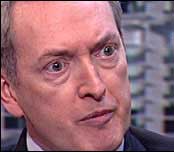
Hutton: disappointment
UK householders were warned to expect years of higher home energy bills to pay for a green power revolution. But nobody told them there could be another way. The sly government news machine announced a massive 90% increase in ground source heating – but forgot to mention this takes the installed base from hardly any to not very much.
John Hutton, the Business Secretary, outlined plans for a massive shift away from fossil fuels to wind, solar and tidal power, but added that “We think there will be a cost.”
So now we know – politicians would rather brave announcing an energy price rise, rather than asking voters to reduce their energy consumption.
The new energy policy contains no incentive for off-grid living, even though that is just as good a way of reducing carbon emissions.
The plan, which he calls the biggest shake-up in Britain’s power generation since the Industrial Revolution, requires £100 billion of new investment but would lead to five years of higher gas and electricity bills from about 2015, he said.
Homeowners will be given financial incentives to fit their roofs with solar panels and there will be ambitious targets to increase their use from 90,000 today to seven million within the next 12 years. The plan also envisages a 90 per cent increase in the use of ground and air-source heat pumps that provide “free” heat by tapping the warmth in the air or the earth.
Mr Hutton will also outline a “feed-in tariff” allowing homes that generate surplus electricity to sell it to the national grid as an incentive to switch.
The news comes a day after the chiefs of the big six energy companies gave warning that energy bills, which have already risen more than 15 per cent this year, would rise again within the next few months because of the rising price of oil.
Mr Hutton said the renewable cost would be “relatively modest”, set against the current increases in the prices of coal, oil and gas and the scale would depend on movements in world oil prices. But he said that it was a necessary price to pay if Britain was serious about addressing climate change and switching to green technology.
“At the end of the day, we as consumers, we pay for the product. That’s how it is,” he said.
Under the green energy programme, more than a third of Britain’s electricity would be generated from wind power by 2020 by 3,500 onshore wind turbines – about 2,000 are currently operational – and 7,000 offshore. This should help Britain to meet its EU target of generating 15 per cent of its energy from renewables by 2020.
Another big growth area will be bio-energy, where about 6 per cent of electricity will be generated from burning wood, straw and energy crops. Large areas of woodland will be used and sewage works will be encouraged to supply biogas. The plan also calls for a steep increase in the use of biofuels to run aircraft and trains.
“The scale of it is unprecedented in the history of our country since the Industrial Revolution,” Mr Hutton said, adding that he wanted carbon to be taken out of the power system altogether by 2050. He said the plan would beside with the Government’s strategy to increase the amount of energy generated by nuclear power from today’s 20 per cent rate.
The biggest challenge, he said, would be attracting companies to make the cumulative £100 billion investment and beating competition from other European countries rushing to do the same thing. If successful, it would lead to the creation of 160,000 British jobs. “We’re in a race for this investment,” he said.
He will also announce today an agreement with Ofgem, the energy regulator, to give priority to renewable projects gaining access to the grid. He has also signed a deal with the MoD to speed up the delivery of offshore wind farms without interfering with radar.
“There is no way of making these changes without there being some impact on the natural environment. I’m afraid some people will look out of their windows and see a wind turbine,” he said. “People need to wake up. We either make these changes or we don’t. What we don’t have is this magic third option of just carrying on as we are.”
